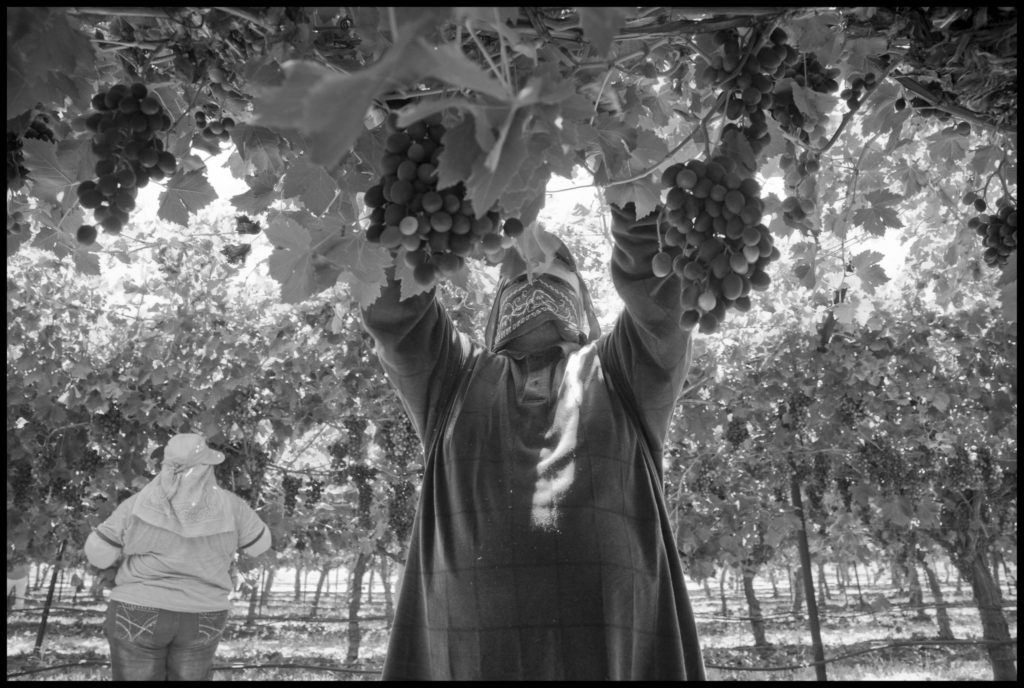Labor & Economy
Key Democrats Could Deny Farm Workers Overtime Pay as Battle Goes Down to the Wire
As Assembly Bill 1066, which would grant overtime pay to California farm workers, heads for a vote in the Assembly, farm workers and faith and civil rights groups are fighting for the votes needed to pass it.

Photo by David Bacon
As Assembly Bill 1066, which would grant overtime pay to California farm workers, heads for a vote in the Assembly, farm workers and faith and civil rights groups are fighting for the votes needed to pass it. In June similar legislation, Assembly Bill 2757, failed when 14 Democrats either voted no, or failed to vote at all — the functional equivalent of a no vote.
On Tuesday, activists and workers mounted human billboards around the offices of two Assemblymembers — Tom Daly in Anaheim and Evan Low in Cupertino. On Wednesday the billboarders’ target was Adrin Nazarian in Van Nuys. In the June vote Low voted no, while Daly and Nazarian were no-shows.
AB 1066 phases in overtime pay, so that farm workers will receive time-and-a-half after 9.5 hours in a day in 2019, nine hours in 2020, 8.5 hours in 2021, and eight hours in 2022 (when they will also receive double time after 12 hours).
Pressure began to mount last week, when legislators, faith leaders and workers participated in a 24-hour fast to call attention to the overtime issue. Commitments to fast came from 11 Assemblymembers, including Lorena Gonzalez (who introduced the bill), Rob Bonta, Joaquin Arambula, Nora Campos, David Chiu, Kansen Chu, Cristina Garcia, Kevin McCarty, Jose Medina, Miguel Santiago and Tony Thurmond. Earlier this week, the State Senate passed the overtime bill and sent it to the Assembly.
California growers had a gross income of $54 billion in 2014, giving them significant political clout and complicating the task of corralling the Democratic votes needed to pass the overtime legislation. Farm workers, on the other hand, have a median income just above $14,000, and 80 percent are immigrants.
Nazarian’s vote has been particularly controversial. He represents the 44th Assembly District, whose residents are 44 percent Latino. In his reelection fight, he faces an ESL teacher and immigration attorney, Angela Rupert, who has attacked him for not supporting farm worker overtime in June.
Daly also represents a district, Anaheim, with a growing Latino population that has helped elect Latino Democratic Congress members, replacing a number of Republicans. Low represents Cupertino, home of Silicon Valley tech giant Apple. Given his heavily urban district, his vote favoring growers puzzled many observers.
In recent weeks both Jewish and African-American groups have sought to win over reluctant Democrats. Referring to the New Deal-era labor law that exempted agricultural workers from federal protections, Rabbi Aryeh Cohen called their exclusion from overtime provisions that cover other workers “a last vestige of this racist holdover” in an article in the Jewish Journal. Alice A. Huffman, president of the California State Conference of the National Association for the Advancement of Colored People (NAACP), wrote a letter to legislators declaring, “for the last 78 years California has failed to bring equality in our workforce. This can no longer be justified or tolerated.”
This week the Assembly passed a similar overtime bill for domestic workers, making the Domestic Workers Bill of Rights a permanent law. It replaces a previous measure that expired after three years. The bill is now on Governor Jerry Brown’s desk. Whether the farm worker bill also goes before Brown will likely come down to the votes of a handful of Assembly Democrats.
-

 State of InequalityApril 4, 2024
State of InequalityApril 4, 2024No, the New Minimum Wage Won’t Wreck the Fast Food Industry or the Economy
-

 State of InequalityApril 18, 2024
State of InequalityApril 18, 2024Critical Audit of California’s Efforts to Reduce Homelessness Has Silver Linings
-

 State of InequalityMarch 21, 2024
State of InequalityMarch 21, 2024Nurses Union Says State Watchdog Does Not Adequately Investigate Staffing Crisis
-

 Latest NewsApril 5, 2024
Latest NewsApril 5, 2024Economist Michael Reich on Why California Fast-Food Wages Can Rise Without Job Losses and Higher Prices
-

 California UncoveredApril 19, 2024
California UncoveredApril 19, 2024Los Angeles’ Black Churches Join National Effort to Support Dementia Patients and Their Families
-

 Latest NewsMarch 22, 2024
Latest NewsMarch 22, 2024In Georgia, a Basic Income Program’s Success With Black Women Adds to Growing National Interest
-

 Latest NewsApril 8, 2024
Latest NewsApril 8, 2024Report: Banks Should Set Stricter Climate Goals for Agriculture Clients
-

 Striking BackMarch 25, 2024
Striking BackMarch 25, 2024Unionizing Planned Parenthood




















